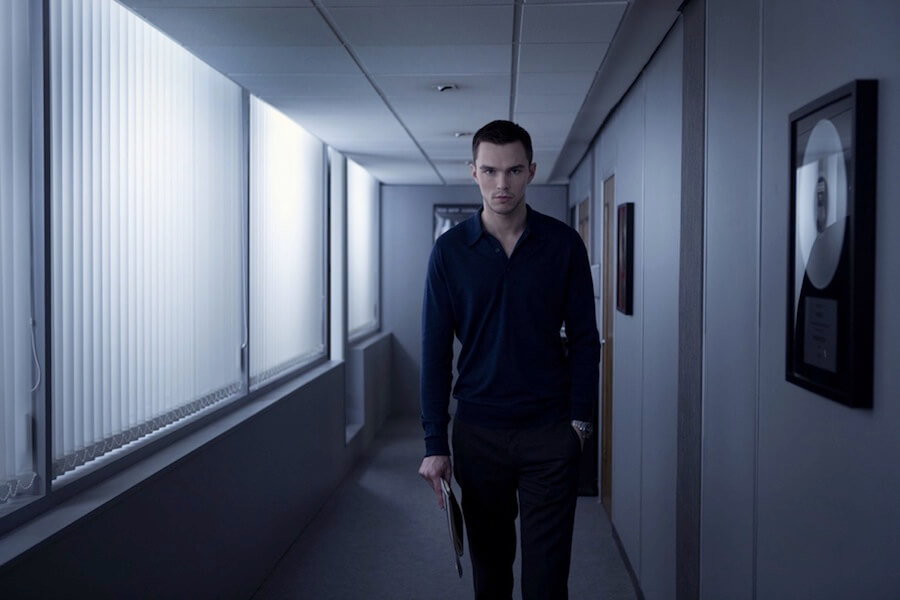‘Kill Your Friends’ As a drug-fueled, money-hungry, flagrantly cynical and probably homicidal A&R shark, Nicholas Hoult storms through “Kill Your Friends” like a psycho Alfie, blabbing conspiratorially to the camera while making like the son of Patrick Bateman — or someone who’s read “American Psycho” too many times and took the wrong lessons. John Niven’s 2008 bestseller and cult fave was indebted to Bret Easton Ellis as well as Chuck Palahniuk. Likewise this film version owes its keyed-up visuals and deafening music cues to the bygone movies made from or inspired by their books. It’s a knockoff that’s also a kind of comfort food, its cheerful misanthropy a throwback to a nastier era — or an era nastier in a more lighthearted way. RELATED: Review: “Miles Ahead” is Don Cheadle’s wild, vital look at Miles Davis “Kill Your Friends” might be a knockoff, but it’s set in 1997 England for a good reason. This was the waning days of Britpop, a brief era when the nation suddenly boasted hip bands who were about to flame out (Oasis) or abruptly overhaul their sound (Blur). Indeed, the latter’s droney “Beetlebum,” off their American grunge-inspired self-titled album, plays over the opening credits. An ambitious low-level creep at a mid-level label, Hoult’s Stelfox is scrambling to sign bands before the trend dies out. He’ll do anything to save his job, though it takes him awhile to be OK with murdering colleagues, including a doughy and dodgy coke freak (James Corden) whose real defining flaw, Stellfox surmises, is he underrates Paul Weller. Hoult is committed and charismatic, and director Owen Harris has dutifully studied the likes of ’90s Danny Boyle, David Fincher and Paul Thomas Anderson. He knows how to create visual comedy in addition to getting fine work from ringers like Craig Roberts, Jim Piddock, Rosanna Arquette and, best of all, scene-stealer Georgia King, as a receptionist with ulterior motives. There’s an arsenal of Britpop and 1997-era ephemera (Chemical Brothers, etc.) at his disposal, and he knows to kick off the movie with a decent joke about failed Menswear — the symbol of Britpop as over-hyped dreck. RELATED: Review: “Everybody Wants Some!!” is Richard Linklater’s latest bittersweet romp But rooted as it is in 1997’s sounds, it doesn’t dig deep enough into why, precisely, this period is so ripe for cutting satire, even though it is. You have to have lived the era — or read John Harris’ excellent “The Last Party,” released in America with the bouncy title “Britpop!,” which flies against the book’s grim, critical tone — to fill in the deeper context: that England had been duped into believing in the delusion of Cool Britannia. They didn’t think, with its music and swaggering new PM, Tony Blair, that things would quickly curdle something fierce. Knowing that, you know Stelfox is merely indulging in End Times panic, following mega-capitalism’s inevitable path to giddy, self-serving murder. The film is too busy having a good, nasty time for that to really stick. And it can be fun. It can also be predictable and lazy, as when Stelfox launches into an impassioned, imagined rant about how record companies are only interested in exploiting talent for cash — as though that was some bombshell worth boasting about at length. Even a film that at one point uses “Karma Police” both earnestly and sarcastically can’t fully atone for times that simply scream generic nihilism. Even Menswear gags and the use of Oasis’ hilariously on-point “Cigarettes and Alcohol” only get you so far.
Director: Owen Harris
Stars: Nicholas Hoult, James Corden
Rating: R
2 (out of 5) Globes
‘Kill Your Friends’ is generic (but still enjoyable) Britpop-era nastiness

Well Go USA
Follow Matt Prigge on Twitter @mattprigge


















